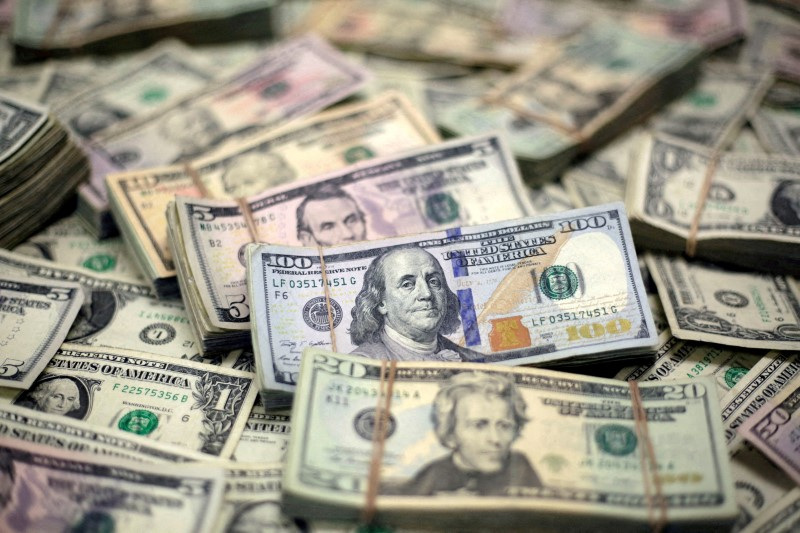Dollar drops as Fed cuts rates, traders unwind some Trump trades
By Karen Brettell and Amanda Cooper
(Reuters) - The dollar held onto earlier losses on Thursday after Federal Reserve Chair Jerome Powell failed to offer any strong clues that the U.S. central bank was likely to pause rate cuts in the near-term, after a widely expected 25 basis point reduction.
Traders also closed out some profitable bets on a Donald Trump presidency after his election victory on Tuesday.
Fed policymakers took note of a job market that has "generally eased" while inflation continues to move towards the U.S. central bank's 2% target.
A much stronger than expected jobs report for September raised expectations that the Fed may make fewer rate cuts, though was followed by surprisingly weak data for October. Analysts said that jobs gains last month were hurt by hurricanes and labor strikes.
In Powell's comments "there was no indication that a pause is under consideration at the Fed. It sounds like they want to get below 4% or very close before thinking about pausing. That's a surprise given the strength of economic data," said Adam Button, chief currency analyst at ForexLive in Toronto
Powell also said that the election won't impact Fed policy in the near-term, saying the U.S. central bank won't speculate on how policies will affect Fed goals.
Traders are pricing 75% odds the Fed will cut rates again in December, up from 69% on Wednesday, according to the CME Group's (NASDAQ:CME ) Fed Watch Tool.
The dollar index was last down 0.67% at 104.40. It hit a four-month high of 105.44 on Wednesday as investors priced in Trump policies.
Trump is expected to clamp down on illegal immigration, enact new trade tariffs, maintain or introduce new tax cuts and loosen business regulations, which analysts see as boosting growth and inflation.
The dollar weakened on Thursday, however, as traders closed some of these positions.
"In the three weeks prior to the election there was a lot of dollar buying and positioning was already quite long the dollar, so I think today's reversal is probably explained by some of these red sweep trades that were put on before the election maybe being partially squared,” said Vassili Serebriakov, an FX strategist at UBS in New York.
Republicans also won the Senate majority, putting the party on track for a clean sweep that would allow it to make larger legislative changes. They are leading the race to win the House of Representatives, though this has yet to be decided.
Serebriakov added that further large gains in the U.S. currency may be unlikely before the impact of new policies including tariffs is felt over the coming two years.
Some market participants are also speculating that tariffs may be used as a negotiating tool and that Trump won't necessarily introduce all the policies he has campaigned on.
"The market is pricing in a return of the first version of Trump, not the guy who is saying he's putting on 10 percent across-the-board tariffs," said Button.
Sterling rose after the Bank of England cut interest rates by 25 basis points but said it expected UK inflation and growth to pick up more quickly than it had previously anticipated.
It was last up 0.78% at $1.2979.
The euro rose 0.62% to $1.0794.
The single European currency shrugged off political crisis in Germany, where the already awkward coalition led by Chancellor Olaf Scholz collapsed late on Wednesday.
The greenback fell 1.05% to 153.01 yen.
The Japanese currency is likely to be hurt by a wide interest rate differential with the United States following Trump's victory. That could heighten pressure on the Bank of Japan to raise interest rates as soon as December to prevent the yen from sliding back toward three-decade lows.
Sweden's Riksbank cut rates by half a point, as expected, leaving the crown up 1.74% against the dollar, while Norges Bank left Norwegian rates unchanged, with the greenback tumbling around 1.8% against the currency.
Bitcoin gained 0.74% to $76,543, after earlier reaching a record $76,980.
Trump is expected to enact a more favorable regulatory environment for the crypto industry.
Source: Investing.com
